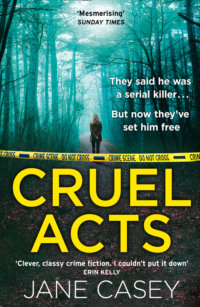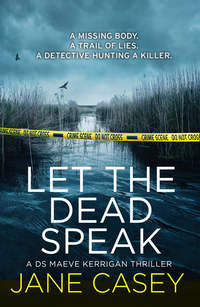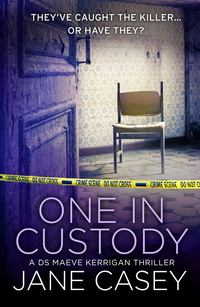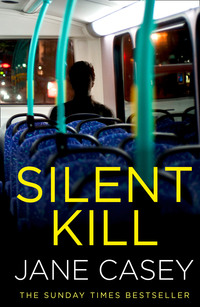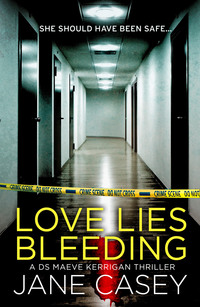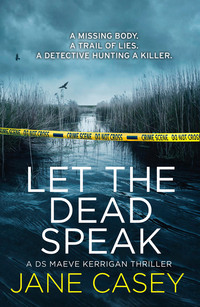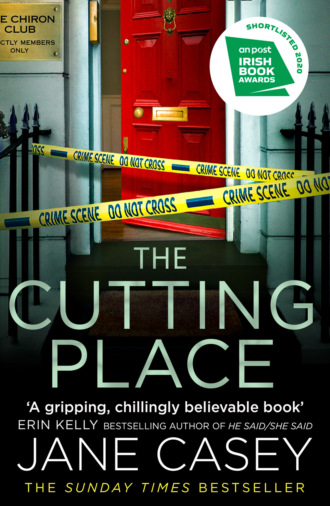
Полная версия
‘Can you tell us anything about what they used to cut her up?’
Dr Early frowned, her forehead puckering. ‘I knew you’d ask that. I’m not an expert in this but I’ve been reading up on it. I’m going to get one of my colleagues to take a much closer look once we’ve cleaned the bones up, so again, this is preliminary information. I can’t give you a detailed description of a cutting tool that you can use to eliminate suspects. But if you look up close at this cut, you can see lines running horizontally across it. They’re called striae and they’re made by the teeth of a saw cutting back and forth. It tells me this wasn’t done with a knife or an axe. They use a chopping motion, not a sawing one.’
‘Could it have been a handsaw?’ I asked.
‘That’s what I think it was, but that would be a long, slow process, especially given the size of the pieces.’ She leaned forward again, beckoning us in for an even closer look. ‘Then this part here – the small step at the bottom? That’s called a breakaway spur, where the bone finally fractured and gave way. The saw didn’t cut cleanly through the entire bone because it didn’t need to – the weight of the bone itself snapped it. If you find the other side of the bone, there’ll be a matching notch in it where this bone came away. Think of breaking a green stick. You don’t get a clean edge – you take a bit of the other side of the break away with you. The size of the spur varies but, in general, the more powerful the saw, the larger the spur. These are small.’
‘Messy,’ I commented.
‘And slow. Cutting someone up isn’t the kind of job where you want to take your time. Bodies are cumbersome and it’s a horrible working environment. On the other hand, if you want to avoid attracting attention, a handsaw has the virtue of being quiet.’ She straightened up. ‘The kerfs will help us narrow down the kind of saw you’re looking for – the number of teeth per inch, the direction of cut, the set of the blade and so forth. We’ll be able to find out a lot more once this lot is under a microscope.’
‘Looking forward to it.’ I ran through my notes. ‘You said she’d been in the water for a couple of days. Any idea when she actually died?’
Dr Early shook her head. ‘Too many variables. We don’t know where the body was kept before or after it was dismembered. If it was refrigerated, for instance, that would have delayed decomp. I don’t have enough of her to tell you anything so useful.’
‘And we don’t have any trace evidence to speak of because of the water.’ Derwent’s shoulders slumped. ‘It’s almost as if they didn’t want us to work out who killed her.’
‘It’s not playing fair, is it? She’s going to be a bit of a mystery until we can find some more of her. Or unless you work out who she is, obviously. That would help.’
‘Wouldn’t it, though?’ I closed my notebook with a snap that made the pathologist’s assistant jump. ‘It shouldn’t take us long to look through the missing person reports for a woman—’
‘—or a man,’ Derwent chipped in helpfully.
‘Who disappeared at some time or other that wasn’t in the last two days, probably, and might be twenty-something and might have light brown hair—’
‘—but otherwise has no distinguishing marks—’
‘—on about ten per cent of his or her body,’ I finished.
‘At least you were paying attention. It sounds as if you’ve got quite a lot of work to do.’ Dr Early nodded at the door. ‘Better get on with it, hadn’t you?’
We were almost at the car when Derwent’s phone rang.
‘Boss.’
I waited, watching his face, trying to read what he was thinking as the boss – DCI Una Burt – talked on, and on, and on. Derwent wasn’t her biggest fan, and the feeling was entirely mutual. He started out looking irritated but that faded, replaced with grim resolve.
‘Yeah. OK. I understand. No, it’s fine.’
Silence as she spoke again. He rubbed his face with the hand that wasn’t holding the phone and turned in a tight circle, impatient now. I could practically hear what he was thinking. Get on with it.
‘Yes. As soon as I can. Yes. Yes. OK.’ He ended the call and stood for a moment, staring down at the phone absently. His face was bleak.
‘Everything all right?’
‘I have to go to Poplar.’
‘Why?’
‘Another case.’ He put his phone away and started searching his pockets, distracted. ‘A cot death. Suspicious circumstances.’
‘Oh.’
‘The boss doesn’t want to send Liv. She thought it might hit too close to home.’
‘Oh,’ I said again, this time with more understanding. Liv was six months pregnant, at the stage where you couldn’t miss it. Sending her to a cot death would be hard on her, and hard on the parents whether they were guilty or not. ‘So she’s sending you?’
‘She asked me if I minded.’
‘And you said you didn’t?’ I raised an eyebrow at him.
‘Look, it’s not my favourite kind of job but I’ll do it. She’s getting Liv to help you on this one instead.’
I didn’t know if I was relieved or disappointed. By swapping a detective inspector and a detective constable, Burt was effectively putting me in charge of finding out who murdered the woman in the river. It was a vote of confidence.
I could have wished it had come on an easier case though.
‘And who are you working with?’
‘Georgia.’
Of course. I did my best to look blandly interested. Detective Constable Georgia Shaw was more or less the last person I’d want to work with, but Derwent didn’t mind her. She was pretty and ambitious and overwhelmingly irritating to me. If Derwent had been describing her, he would have stopped at pretty, and that seemed to be good enough for him.
He was still patting his pockets, swearing under his breath.
‘I have the car keys,’ I said. ‘If that’s what you’re looking for.’
‘Why didn’t you say?’ He held out his hand for them and I shook my head.
‘I’ll drive.’ I wanted him to have time to prepare himself for what lay ahead, to get his game face ready. He wasn’t as tough as he pretended to be, I knew, and when cases involved children he struggled to maintain his objectivity. Taking on this case would cost him something he’d never admit, even to himself. But I couldn’t say any of that out loud. ‘I need to get back to the office and I don’t trust you not to drop me at the nearest tube station so you can get to Poplar sooner.’
‘I would never do that,’ Derwent protested.
‘You’ve done it before.’
‘Only a couple of times.’
‘And I should have learned my lesson after the first time.’
He looked amused. ‘Thanks, Kerrigan.’
‘Any time.’ I unlocked the car. ‘Now get in. We have places to be.’
3
Five hours after leaving the morgue, I had looked at hundreds of missing persons files on my flickering computer screen. The smudgy images and bland descriptions had all merged into one faceless, anonymous woman. I leaned back in my chair and tipped my chin up, easing the muscles in my neck.
‘I can’t bear to look at any more. My eyeballs feel like leather. I can’t tell if there’s something wrong with my screen or my eyes.’
‘No luck?’ DCI Burt paused by my desk and peered at my notes. ‘You’ve got a shortlist, I see.’
‘Of sorts, ma’am.’ I straightened up, pulling myself together, because she was the boss after all. ‘The trouble is that there are too many women who fit the description of what we’ve found.’
‘We limited it to women who’ve gone missing in the last month.’ Liv was looking pale, I noticed, with dark shadows under her eyes. She was slight and delicate, and six months of pregnancy had left her more exhausted than blooming. It had given her backache, insomnia, heartburn, an insatiable appetite for cake and an obsession with finding the perfect pram which involved endless arguments with her girlfriend over email. I had found her relieved beyond words not to be heading to Poplar, but now I wondered if she was regretting it. Ploughing through missing persons reports was unrewarding to say the least.
‘Dr Early thought she was IC1 but we’ve included other races, just in case she’s not white. She could be light-skinned,’ I said.
‘And we’re including females aged thirteen to forty,’ Liv added.
‘Wise,’ Burt said. ‘I’ve seen the pictures from the morgue. They looked as if she could be anything. We probably shouldn’t rule too many people out.’
‘But that doesn’t really help us to narrow it down in any meaningful way,’ I explained. ‘The volume of mispers is too high. There are too many runaways and domestic violence victims and people skipping out on rent or expired visas, let alone women who might have actually come to harm.’
‘Especially since we have to look at mispers from outside the Met too.’ Liv sighed. ‘There’s nothing to say she went missing in London, just because she ended up in that part of the Thames.’
‘You’re going to have to make some choices about who you include eventually,’ Burt said. ‘Use your judgement. But remember that you’ll make things very hard for yourself if you can’t identify her.’
No shit. ‘On the bright side, she looked as if she’d been taking care of herself. I’d be very surprised if she was someone who would count as a vulnerable adult,’ I said. ‘I’m leaving out homeless people, known drug users – anyone who is unlikely to have time for a full wax and manicure every couple of weeks, basically.’
‘But what we really need is a DNA match,’ Burt said.
‘It would be a help.’
‘We might have her on our list already but we won’t know it until the DNA comes in,’ Liv said.
‘Assuming someone’s reported her missing and we’ve taken it seriously enough to put her DNA in the system.’ Burt smiled at me and carried on to her office, as if she’d said something helpful.
‘Yes, we may never identify her. Thanks so much for your input, boss,’ I muttered.
Liv yawned. ‘Do you think it’s time to knock it on the head for today?’
‘Definitely.’ I checked the time. ‘Shit, I’ve got to get changed.’
‘Going out?’
‘I’ve got a yoga class.’
‘You are going to yoga. Maeve Kerrigan, going to yoga.’
I stood up and stretched. ‘What’s so weird about that? It’s good for my posture.’
‘Yeah, of course it is. But that’s not usually a priority.’ Liv darted over and yanked open the bottom drawer of my desk before I could stop her. ‘What the hell is this?’
‘Snacks.’
‘Nope. Don’t lie. These are not snacks. You used to have snacks in here. There used to be crisps and multipacks of Twixes. Don’t try to pretend this is the same.’ She started going through the packets. ‘Puffed peas – I don’t even know what they are. Turkey jerky, gross. Cashew butter protein balls, no thanks. Spicy chickpeas. This is so bleak. Where’s the chocolate?’
‘There’s probably something in there like chocolate.’
She pulled out a bar and inspected it. ‘This is carob. Carob. I’m going to be sick.’
‘I’m being healthy. So what?’
‘It’s not healthy to eat spiced grit for the sake of feeling virtuous. Baked hemp sticks, for God’s sake.’ She threw them back into the drawer and shook her head. ‘And they say pregnant women are supposed to eat loads of weird stuff. I wouldn’t touch any of that.’
‘Oh, come on.’ I toed the drawer shut. ‘Stop giving me a hard time.’
‘This is all his idea, isn’t it?’ She meant my boyfriend, Seth Taylor.
I felt the colour rise in my cheeks at her tone. ‘Seth did suggest it.’
‘And the yoga is his idea too, I bet.’
‘I’m meeting him there.’
‘Couples yoga? Please tell me you’re joking.’
I grinned at her horror. ‘It helps my stress levels and my flexibility. It’s fun, too. Don’t knock it until you’ve tried it.’
‘You’ve changed.’ Liv was looking at me as if she was confused about something. ‘I’ve never known anyone who needed to do yoga as much as you do, but I can’t help noticing that you’ve avoided doing anything healthy for as long as I’ve known you. You thrive on shit food and too much caffeine. If you’re not stressed out of your mind, who even are you?’
‘A better person. A happier person.’
‘I suppose that’s a good thing.’ She didn’t sound as if she was convinced about it though.
I grabbed my bag from under the desk. ‘I’m going to get changed. Help yourself to a snack if you’re peckish. I can recommend the kale crisps.’
‘No, you can’t.’
She was right, I couldn’t, but I wanted to get rid of them. ‘Try them. Maybe you’ll like them.’
‘What do they taste like?’
‘Indescribable,’ I said truthfully.
I’d never actually asked her, but I had a secret suspicion that Liv didn’t like Seth much. There was no law that your friends had to like your boyfriend, I reminded myself as I laced up my trainers in the locker room. And Liv was picky about men. Seth was used to winning women over on sight, but his height and build and wide smile had cut no ice with Liv. It was taking him longer than I’d expected to work out how to deal with a woman who wasn’t attracted to him, someone he couldn’t charm. Their sense of humour was very different, and Seth could come across as arrogant, unless you knew him well. He had a lawyer’s need to get the upper hand in arguments and persevered even when I was trying to change the subject, a little beyond the limits of polite conversation. But he could have been Prince Charming and it wouldn’t have mattered. She was always going to prefer my old boyfriend, Rob, even though he had broken my heart. There was no one else who would be good enough for her.
I had needed to move on, I told myself. Rob was old news. Besides, Seth cared about me. He was attentive and kind and made me feel as if I was the centre of his world, not an afterthought. As if to prove it, my phone pinged with a message.
Don’t forget we have yoga.
I snapped a picture of myself in leggings and sports bra in the mirror and sent it to him.
See you there!
The phone hummed in my hand.
Good girl.
I pulled a face and threw my phone into my bag. ‘Good girl’ sounded patronising even if he didn’t mean it that way. I’d mentioned it before, and hurt his feelings. I wouldn’t bother raising it with him again. Compared to everything else I got out of our relationship a throwaway remark was the opposite of important. He was perfect in almost every way and I was fixating on the tiniest of flaws.
He was almost too perfect.
I slammed my locker door, irritated with myself. Really, there was something wrong with me if I wanted a boyfriend who was more detached, less keen, harder work. Seth was easy. I was the one who made things difficult. I needed to relax.
Hence the yoga.
‘Going out?’ Georgia Shaw was unlocking her own locker.
‘Exercise class.’ I shrugged myself into a hoodie. ‘How was Poplar?’
‘Grim. Very, very grim. A six-week-old baby. A little girl. Both the parents are distraught, as you can imagine. We had to take the bedclothes, the toys, search everything, ask them loads of questions. The baby was so tiny. Like a doll.’ She leaned against the lockers. Her make-up had smudged under her eyes and she’d chewed off her perfect pink lipstick. ‘How were the body parts?’
‘Inconclusive.’ We weren’t friends – we might never be friends – but I was trying to make common ground with Georgia where I could. I didn’t want her as an enemy. ‘Is Derwent back?’
‘He stayed in the house.’
‘Huh.’ I shouldered my bag. ‘Interesting.’
‘You’re really unfair to him, you know.’
I stopped on my way to the door. ‘Excuse me?’
‘The way you said it was interesting. It wasn’t interesting. It was kind. He’s got a heart of gold.’ Her voice sounded strained as if she was on the edge of tears.
‘What makes you say that?’
‘The last thing I would want to do is stay in that house. We’ve been there all day, getting in the way, making cups of tea and trying to say something comforting. It was stifling. Mind-numbing. I couldn’t wait to get out of there, so I could breathe again. But Josh stayed. He said he’d be there as long as they needed him to be there.’
‘I bet they were delighted.’
‘They’re grieving. Of course they weren’t delighted. But it’s got to be a comfort for them. Josh was so kind. He even carried the baby out to the ambulance when they took it away for the post-mortem.’
I could imagine it quite clearly, I found: the small bundle held with tenderness on her last journey out of the only home she had known in her short life. Derwent would do that well.
‘Was she their first child?’
‘Yes.’
‘What’s the age-gap between the parents?’
‘She’s only seventeen. He’s twenty-eight. How did you know there was an age gap?’
I ignored the question. ‘Are they close?’
‘Very. They were supporting each other through it. Barely left each other’s sides all day.’
‘Josh isn’t staying because he thinks they need his support. He’s staying because one of them killed the baby and the other one will tell him the truth.’
Her eyes went wide. ‘No way. You didn’t see them. They’re devoted to each other.’
‘Some time tonight, or tomorrow, or the day after, maybe when everyone’s supposed to be asleep, one of them will come downstairs because he or she can’t stand to share a bed with their child’s killer. Guess who will be waiting. He’s shown he cares about their child, and about them. He’ll have grieved with them. They’ll have come to trust him. Even if they don’t want to get their partner in trouble, they’ll be exhausted by the effort of lying all the time. That’ll wear their resistance down until they find themselves telling him the truth.’
‘You’re so cold. Every tragic death isn’t a crime, you know, and everyone doesn’t lie.’
‘No, but—’
‘You don’t know these people. They’re a sweet couple. The nursery was beautiful. And she was a gorgeous little girl. She only started smiling two days ago.’ Georgia’s bottom lip trembled before she could stop it and there were tears standing in her eyes.
‘I know Josh Derwent and I know he’s not spending the night there because he thinks this was a tragic accident. I’ve seen him do it before.’ I shrugged. ‘It doesn’t mean he’s faking it, you know. He’ll be just as upset as you are about the baby. That’s where he gets his energy from. He won’t give up until they give in.’
‘You’re wrong. He’d have told me.’
‘Nope. He wanted them to think they’re going to get away with it. That’s more likely if you’re sincerely sorry for them.’
‘You mean he doesn’t trust me.’
‘I have no idea whether he trusts you or not.’ But I definitely don’t, so …
She lifted her chin, hurt. ‘I think you’re wrong. You don’t know anything about them, or the baby. You’re jumping to conclusions.’
‘Probably.’ I zipped up my top. ‘We’ll have to wait and see who’s right.’
‘Enjoy your exercise class.’
I thanked her as if she’d meant it, and left.
Two years earlier
To his great disappointment, he wasn’t dead – he just felt that way. A bird had woken him, singing frantically in the tall trees that screened the house from the road, throwing an alarm call into the still silence.
(And how did he know about the trees? It had been dark when they got there, piling out of the car onto the gravel drive, and he had been drunk already. Whose house? Whose idea to go there? Who had been with him in the car, jammed up against his legs, a high-heeled sandal digging into his instep when the girl moved carelessly? Who had stolen the champagne, handing him a bottle that he’d tipped down his front in the dark, on the motorway?)
Waking up properly was slow, a process of adjustments. He had a temperature, but no, he didn’t, it was the room that was hot. He felt dreadful. He was ill. No, hungover. The thumping headache, the nausea, the felted surface of his tongue, the burning dryness of his eyeballs: all of that was a hangover. There was someone lying beside him, but no, there wasn’t, it was a coverlet rucked up into a ridge that pressed against his thigh companionably. His watch had been stolen – no, he hadn’t worn a watch. He had dreamed such a strange, exciting dream, weird and utterly wrong—
Not a dream. He sat up. He remembered.
The bird was quiet now, stunned into silence by the heat of the day. The curtains were open, limp in the airless warmth. The sun struck into the room, across the floor. And here came fear, like an unwanted guest swaggering into the room to sit on the edge of the bed and chatter.
The small injuries that told him what he remembered was true. Here, a bruise. There, a bite mark.
white teeth in the dim light grinning as he hissed in pain and pleasure and reached out—
He couldn’t get away from the shards of memories that kept slicing into his brain.
Kissing, too aroused to be wary.
The taste, wine edged with tobacco and salt from the sweat that glazed them both.
Full lips, a probing tongue, a tattoo that covered one beautiful arm from shoulder to wrist, a flat stomach, long legs.
He had been clumsy, fumbling with a button. A laugh in his ear that he felt as much as heard, and then a whisper.
‘Come on. Let’s go somewhere else.’
Which meant that part had been in front of everyone. Anyone could have seen.
Stumbling into the bedroom, kissing already, his clothes coming off, until they were both naked.
We don’t have to
I want to
Say if you want to stop
Please
You’re hurting me
Oh God
The door had been open. He remembered that. He remembered someone standing, watching them for a while.
What had he done?
4
I couldn’t see the river from where I stood, but I knew it was there. The harsh squabbling of seagulls cut through the air, louder than the traffic rumbling past the end of the quiet street. The morning light had a pearly quality, hazy as an impressionist painting, and the breeze carried a faint, dank suggestion of briny water and black mud. I wondered if the woman had been drawn to the river in life as in death – if that was why she had chosen Greenwich as a home, if she had been fascinated by the dark water sliding endlessly towards oblivion in the sea, or if she had had any inkling that one day it would take her too …
‘Maeve.’
I pulled my mask back up to give myself some protection from the smell before I turned away from the window and faced the room. Liv was making her way towards me carefully, picking her way over boxes and the legs of a crime-scene officer who was lying on the floor, inspecting the area under the kitchen cupboards.
Two tedious days of file-sifting and phone calls and river-dredging had ended with a positive DNA match, the miracle of forensic science coming to our aid with an unarguable answer that should have made my life easier. The woman in the river had a name and a face now, as well as an address and a job: Paige Hargreaves, 28, freelance journalist. I could congratulate myself that she had at least featured in one of the piles of possible victims. I might have tracked her down eventually, without the DNA match, but it would have taken weeks, and it would have been a provisional identification. DNA left no room for doubt.
Being in her home should have given me a proper insight into the murdered woman. In my experience, there was no quicker way to get to know someone than to see where and how they lived. On this occasion, though, I was finding it hard to concentrate, which explained why I was lurking by the window instead of searching. Partly it was the smell: the unemptied bin, the fridge full of sour milk and greenish meat, a bowl of blackened bananas and soft brown grapes complete with orbiting fruit flies. Partly it was the forensic investigators who were tripping over one another in their efforts to examine every inch of the small flat’s rooms. Mainly, though, it was the mess that was frustrating me.


